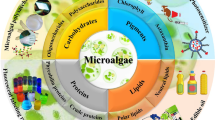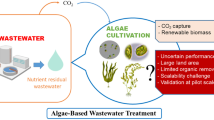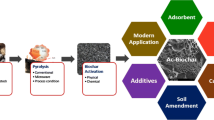Abstract
Microbial fuel cells (MFCs) are the efficient and sustainable approach for the removal of toxic metals and generate energy concurrently. This article highlighted the effective use of rotten rice as an organic source for bacterial species to generate electricity and decrease the metal concentrations from wastewater. The obtained results were corresponding to the unique MFCs operation where the 510 mV voltage was produced within 14-day operation with 1000 Ω external resistance. The maximum power density and current density were found to be 2.9 mW/m2 and 168.42 mA/m2 with 363.6 Ω internal resistance. Similarly, the maximum metal removal efficiency was found to be 82.2% (Cd), 95.71% (Pb), 96.13% (Cr), 89.50% (Ni), 89.82 (Co), 99.50% (Ag), and 99.88% (Cu). In the biological test, it was found that Lysinibacillus strains, Chryseobacterium strains, Escherichia strains, Bacillus strains are responsible for energy generation and metal removal. Furthermore, a multiparameter optimization revealed that MFCs are the best approach for a natural environment with no special requirements. Lastly, the working mechanism of MFCs and future recommendations are enclosed.






Similar content being viewed by others
References
Abbas SZ, Rafatullah M, Ismail N, Syakir MI (2017) A review on sediment microbial fuel cells as a new source of sustainable energy and heavy metal remediation: mechanisms and future prospective. Int J Energy Res 41(9):1242–1264
Asefi B, Li S-L, Moreno HA, Sanchez-Torres V, Hu A, Li J, Yu C-P (2019) Characterization of electricity production and microbial community of food waste-fed microbial fuel cells. Process Saf Environ Prot 125:83–91
Asim AY, Mohamad N, Khalid U, Tabassum P, Akil A, Lokhat D, Siti H (2021) A glimpse into the microbial fuel cells for wastewater treatment with energy generation. Desalin Water Treat 214:379–389
Ayangbenro AS, Babalola OO (2020) Genomic analysis of Bacillus cereus NWUAB01 and its heavy metal removal from polluted soil. Sci Rep 10:1–12
Azhari NW (2019) The performance of takakura composting using food waste from Makanan Ringan Mas Industry. Universiti Tun Hussein Onn, Malaysia
Chae K-J, Choi M-J, Kim K-Y, Ajayi F, Park W, Kim C-W, Kim IS (2010) Methanogenesis control by employing various environmental stress conditions in two-chambered microbial fuel cells. Bioresour Technol 101:5350–5357
Choi C, Hu N, Lim B (2014) Cadmium recovery by coupling double microbial fuel cells. Bioresour Technol 170:361–369
Chuo SC, Mohamed SF, Mohd Setapar SH, Ahmad A, Jawaid M, Wani WA, Yaqoob AA, Mohamad Ibrahim MN (2020) Insights into the Current Trends in the Utilization of Bacteria for Microbially Induced Calcium Carbonate Precipitation. Materials 13:4993
Do M, Ngo H, Guo W, Liu Y, Chang S, Nguyen D, Nghiem L, Ni B (2018) Challenges in the application of microbial fuel cells to wastewater treatment and energy production: a mini review. Sci Total Environ 639:910–920
Du Z, Li H, Gu T (2007) A state of the art review on microbial fuel cells: a promising technology for wastewater treatment and bioenergy. Biotechnol Adv 25:464–482
Goud RK, Mohan SV (2011) Pre-fermentation of waste as a strategy to enhance the performance of single chambered microbial fuel cell (MFC). Int J Hydrog Energy 36:13753–13762
Goud RK, Babu PS, Mohan SV (2011) Canteen based composite food waste as potential anodic fuel for bioelectricity generation in single chambered microbial fuel cell (MFC): bio-electrochemical evaluation under increasing substrate loading condition. Int J Hydro Energy 36:6210–6218
Hong Y, Call DF, Werner CM, Logan BE (2011) Adaptation to high current using low external resistances eliminates power overshoot in microbial fuel cells. Biosens Bioelectron 28:71–76
Hsu L, Chadwick B, Kagan J, Thacher R, Wotawa-Bergen A, Richter K (2013) Scale up considerations for sediment microbial fuel cells. RSC Adv 3:15947–15954
Huang L, Chai X, Quan X, Logan BE, Chen G (2012) Reductive dechlorination and mineralization of pentachlorophenol in biocathode microbial fuel cells. Bioresour Technol 111:167–174
Hung Y-H, Liu T-Y, Chen H-Y (2019) Renewable coffee waste-derived porous carbons as anode materials for high-performance sustainable microbial fuel cells. ACS Sustain Chem Eng 7:16991–16999
Jia J, Tang Y, Liu B, Wu D, Ren N, Xing D (2013) Electricity generation from food wastes and microbial community structure in microbial fuel cells. Bioresour Technol 144:94–99
Li Z, Zhang X, Lei L (2008) Electricity production during the treatment of real electroplating wastewater containing Cr6+ using microbial fuel cell. Process Biochem 43:1352–1358
Li H, Tian Y, Zuo W, Zhang J, Pan X, Li L, Su X (2016) Electricity generation from food wastes and characteristics of organic matters in microbial fuel cell. Bioresour Technol 205:104–110
Li M, Zhou S, Xu Y (2019) Performance of Pb (II) reduction on different cathodes of microbial electrolysis cell driven by Cr (VI)-reduced microbial fuel cell. J Power Sources 418:1–10
Logan BE, Hamelers B, Rozendal R, Schröder U, Keller J, Freguia S, Aelterman P, Verstraete W, Rabaey K (2006) Microbial fuel cells: methodology and technology. Environ Sci Technol 40:5181–5192
Mathivanan K, Rajaram R, Balasubramanian V (2016) Biosorption of Cd (II) and Cu (II) ions using Lysinibacillus fusiformis KMNTT-10: equilibrium and kinetic studies. Desalin Water Treat 57:22429–22440
Mohan SV, Srikanth S, Raghuvulu SV, Mohanakrishna G, Kumar AK, Sarma P (2009) Evaluation of the potential of various aquatic eco-systems in harnessing bioelectricity through benthic fuel cell: effect of electrode assembly and water characteristics. Bioresour Technol 100:2240–2246
Mohan SV, Mohanakrishna G, Chiranjeevi P (2011) Sustainable power generation from floating macrophytes based ecological microenvironment through embedded fuel cells along with simultaneous wastewater treatment. Bioresour Technol 102:7036–7042
Moharir PV, Tembhurkar AR (2018) Effect of recirculation on bioelectricity generation using microbial fuel cell with food waste leachate as substrate. Int J Hydrog Energy 43:10061–10069
Nandy A, Kumar V, Kundu PP (2013) Utilization of proteinaceous materials for power generation in a mediatorless microbial fuel cell by a new electrogenic bacteria Lysinibacillus sphaericus VA5. Enzym Microb Technol 53:339–344
Nevin KP, Kim B-C, Glaven RH, Johnson JP, Woodard TL, Methé BA, DiDonato RJ Jr, Covalla SF, Franks AE, Liu A (2009) Anode biofilm transcriptomics reveals outer surface components essential for high density current production in Geobacter sulfurreducens fuel cells. PLoS One 4:e5628
Nimje VR, Chen C-Y, Chen C-C, Jean J-S, Reddy AS, Fan C-W, Pan K-Y, Liu H-T, Chen J-L (2009) Stable and high energy generation by a strain of Bacillus subtilis in a microbial fuel cell. J Power Sources 190:258–263
Nishioka T, Elsharkawy MM, Suga H, Kageyama K, Hyakumachi M, Shimizu M (2016) Development of culture medium for the isolation of Flavobacterium and Chryseobacterium from rhizosphere soil Microbes and Environments ME15144
Reddy AVB, Madhavi V, Ahmad A, Madhavi G (2021): Heavy Metals Removal Using Carbon Based Nanocomposites, Environmental Remediation Through Carbon Based Nano Composites. Springer 249-274
Rikame SS, Mungray AA, Mungray AK (2012) Electricity generation from acidogenic food waste leachate using dual chamber mediator less microbial fuel cell. Int Biodeterior Biodegradation 75:131–137
Xin X, Ma Y, Liu Y (2018) Electric energy production from food waste: microbial fuel cells versus anaerobic digestion. Bioresour Technol 255:281–287
Yaqoob AA, Ibrahim MNM, Rodríguez-Couto S (2020a) Development and modification of materials to build cost-effective anodes for microbial fuel cells (MFCs): an overview. Biochem Eng J 107779
Yaqoob AA, Ibrahim MNM, Yaakop AS, Umar K, Ahmad A (2020b) Modified Graphene Oxide Anode: a Bioinspired Waste Material for Bioremediation of Pb2+ with Energy Generation through Microbial Fuel Cells. Chem Eng J:128052
Yaqoob AA, Khatoon A, Mohd Setapar SH, Umar K, Parveen T, Mohamad Ibrahim MN, Ahmad A, Rafatullah M (2020c) Outlook on the role of microbial fuel cells in remediation of environmental pollutants with electricity generation. Catalysts 10:819
Yaqoob AA, Mohamad Ibrahim MN, Rafatullah M, Chua YS, Ahmad A, Umar K (2020d) Recent advances in anodes for microbial fuel cells: an overview. Materials 13:2078
Yaqoob AA, Mohamad Ibrahim MN, Umar K, Bhawani SA, Khan A, Asiri AM, Khan MR, Azam M, AlAmmari AM (2021a) Cellulose Derived Graphene/Polyaniline Nanocomposite Anode for Energy Generation and Bioremediation of Toxic Metals via Benthic Microbial Fuel Cells. Polymers 13:135
Yaqoob AA, Serrà A, Ibrahim MNM, Yaakop AS (2021b) Self-assembled oil palm biomass-derived modified graphene oxide anode: an efficient medium for energy transportation and bioremediating Cd (II) via microbial fuel cells. Arab J Chem 14:103121
Yaqoob AA, Ibrahim MNM, Guerrero-Barajas C (2021c) Modern trend of anodes in microbial fuel cells (MFCs): an overview. Environ Technol Innov 23:101579
Yuan Y, Zhao B, Zhou S, Zhong S, Zhuang L (2011) Electrocatalytic activity of anodic biofilm responses to pH changes in microbial fuel cells. Bioresour Technol 102:6887–6891
Yusoff MZM, Hu A, Feng C, Maeda T, Shirai Y, Hassan MA, Yu C-P (2013) Influence of pretreated activated sludge for electricity generation in microbial fuel cell application. Bioresour Technol 145:90–96
Acknowledgements
This research article was financially supported by Universiti Sains Malaysia, (Malaysia) under the Research Grant; 304/PKIMIA/6501153/E128.
Data availability statement
The authors confirm that all data underlying the findings are fully available without restriction. Data can be obtained after submitting a request to the corresponding/first author.
Author information
Authors and Affiliations
Contributions
Mohamad Nasir Mohamad Ibrahim, Asim Ali Yaqoob: Conceptualization. Najwa Najihah Mohamad Daud, Asim Ali Yaqoob: Methodology, writing-original draft preparation, visualization, electromicrobiology investigation. Akil Ahmad: English editing and revision of the manuscript. Mohamad Nasir Mohamad Ibrahim: Supervision, funding acquisition. This article has been read and approved by all listed authors.
Corresponding authors
Ethics declarations
Ethics approval and consent to participate
Not applicable.
Consent for publication
Not applicable.
Competing interests
The authors declare no competing interests.
Additional information
Responsible Editor: Weiming Zhang
Publisher’s note
Springer Nature remains neutral with regard to jurisdictional claims in published maps and institutional affiliations.
Supplementary Information
ESM 1
(DOCX 616 kb)
Rights and permissions
About this article
Cite this article
Daud, N.N.M., Ahmad, A., Yaqoob, A.A. et al. Application of rotten rice as a substrate for bacterial species to generate energy and the removal of toxic metals from wastewater through microbial fuel cells. Environ Sci Pollut Res 28, 62816–62827 (2021). https://doi.org/10.1007/s11356-021-15104-w
Received:
Accepted:
Published:
Issue Date:
DOI: https://doi.org/10.1007/s11356-021-15104-w




